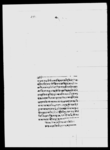An arjī from Lokaramaṇa Upādhyāya re the departure of the governor general from Calcutta, a meeting with the governor general’s secretary and the British victory in the Battle of Kabul (VS 1899)
ID: DNA_0001_0097
Edited and
translated by Manik Bajracharya, Simon Cubelic, Rajan Khatiwoda
Created: 2016-03-01;
Last modified: 2023-06-05
For the metadata of the document, click here
The accompanying edition, translation/synopsis and/or commentary are available under the terms of the Creative Commons Attribution-ShareAlike 4.0 International License
Abstract
In this letter Lokaramaṇa Upādhyāya reports about the departure of the governor general to the North-Western Provinces, a meeting with the governor general’s secretary and the British military victory in Kabul during the First Anglo-Afghan War (1839–1842).Diplomatic edition
[1r]
1श्री\1⟪नं.९७⟫1अर्जि ¯ ¯ ¯ ¯ ¯ ¯2उप्रन्तगव़र्नर्जनरलपश्चिमगयादेखियाँहाँमा
3मूलिदर्वारभयाकोथिएनआश्विशुक्ल५रोज७
4कादिनसाहवसिक्रिटरिकाँहाँदर्वारभयोहजूर
5कामिजाजमुवारक्कोषैरआफ़ियत्सोध्याव
6हुतषुसिवाषुसिहुनुहुन्छभनिजव़ावदियाँभाद्र
7शुक्ल१२कादिनकावुल्काकिल्लामाअंरेजको
8अमलभयोभन्याषवरयाँहाँअषवारमाछापि
9याकोछफारसिअषवार२हजूर्माचढाईप
10ठायाकाछन्नजर्फर्माइवक्स्यागयाकावुल्
11कोहव़ालजाहिरहोलाईतिसंमत्१८९९साल
12मितिआश्विनशुक्ल१०रोज६मोका
13मकल्कत्ताचीतपूरशुभम् ¯ ¯ ¯ ¯ ¯ ¯
14सेव़कलोकरमणोपाध्यायकोवेदो
15क्तशुभआसिर्वादसहश्रम् ¯ ¯ ¯ ¯ ¯ ¯
Translation
[1r]
Number 971
Arjī - - -
Uprānta: Since the governor general departed for the Western [Provinces] there has not been any regular court assembly (darbāra) held. There was a court assembly held with the governor general’s secretary (sāhaba sikriṭari)2 on Saturday, the 5th of the bright fortnight of Āśvina. [He] asked about your well-being and spirits. I replied that you are in very good spirits. The news has been published in newspapers here that the English gained a victory at the fort of Kabul3 on the 12th of the bright fortnight of Bhādra. Two Persian newspapers have been sent to you. The situation in Kabul will become clear[er] if you cast your eyes on them.
Friday, the 10th of the bright fortnight of Āśvina in the [Vikrama] era year 1899 (1842 CE). Residence: Chitpur, Calcutta. Auspiciousness.
Thousands of auspicious blessings from [your] servant Lokaramaṇa Upādhyāya as uttered in the Vedas.
Commentary
This report of Lokaramaṇa Upādhyāya refers to two historical events. The first one is the departure of Governor General Edward Law, 1st Earl of Ellenborough who took over office from Lord Auckland on 28 February 1842 (Anonymous 1842: 37), on a tour to the North-Western Provinces in April 1842 (Anonymous 1842: 142). The second one is the First Anglo-Afghan War (1839–1842). Lokaramaṇa reports about the Battle of Kabul, in which the so called "Army of Retribution" under the command of Major General Sir George Pollock destroyed parts of Kabul in September 1842. The army was dispatched by Governor General Lord Auckland as retaliation for the Massacre of Elphinstone's army in January 1842 and to recover prisoners captured during that British defeat. An account on the British advance to and capture of Kabul is given by Findlay 2014: 233.

